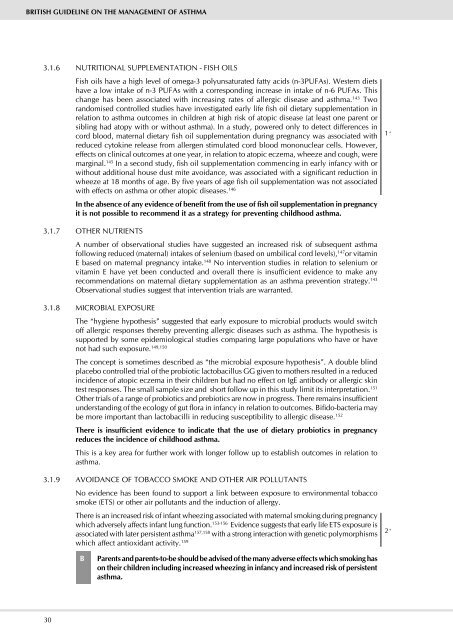sign101
sign101
sign101
Create successful ePaper yourself
Turn your PDF publications into a flip-book with our unique Google optimized e-Paper software.
British Guideline on the MAnAGeMent of AsthMA<br />
3.1.6 NUTRITIONAL SUPPLEMENTATION - FISH OILS<br />
30<br />
Fish oils have a high level of omega-3 polyunsaturated fatty acids (n-3PUFAs). Western diets<br />
have a low intake of n-3 PUFAs with a corresponding increase in intake of n-6 PUFAs. This<br />
change has been associated with increasing rates of allergic disease and asthma. 143 Two<br />
randomised controlled studies have investigated early life fish oil dietary supplementation in<br />
relation to asthma outcomes in children at high risk of atopic disease (at least one parent or<br />
sibling had atopy with or without asthma). In a study, powered only to detect differences in<br />
cord blood, maternal dietary fish oil supplementation during pregnancy was associated with<br />
reduced cytokine release from allergen stimulated cord blood mononuclear cells. However,<br />
effects on clinical outcomes at one year, in relation to atopic eczema, wheeze and cough, were<br />
marginal. 145 In a second study, fish oil supplementation commencing in early infancy with or<br />
without additional house dust mite avoidance, was associated with a significant reduction in<br />
wheeze at 18 months of age. By five years of age fish oil supplementation was not associated<br />
with effects on asthma or other atopic diseases. 146<br />
In the absence of any evidence of benefit from the use of fish oil supplementation in pregnancy<br />
it is not possible to recommend it as a strategy for preventing childhood asthma.<br />
3.1.7 OTHER NUTRIENTS<br />
A number of observational studies have suggested an increased risk of subsequent asthma<br />
following reduced (maternal) intakes of selenium (based on umbilical cord levels), 147 or vitamin<br />
E based on maternal pregnancy intake. 148 No intervention studies in relation to selenium or<br />
vitamin E have yet been conducted and overall there is insufficient evidence to make any<br />
recommendations on maternal dietary supplementation as an asthma prevention strategy. 143<br />
Observational studies suggest that intervention trials are warranted.<br />
3.1.8 MICROBIAL ExPOSURE<br />
The “hygiene hypothesis” suggested that early exposure to microbial products would switch<br />
off allergic responses thereby preventing allergic diseases such as asthma. The hypothesis is<br />
supported by some epidemiological studies comparing large populations who have or have<br />
not had such exposure. 149,150<br />
The concept is sometimes described as “the microbial exposure hypothesis”. A double blind<br />
placebo controlled trial of the probiotic lactobacillus GG given to mothers resulted in a reduced<br />
incidence of atopic eczema in their children but had no effect on IgE antibody or allergic skin<br />
test responses. The small sample size and short follow up in this study limit its interpretation. 151<br />
Other trials of a range of probiotics and prebiotics are now in progress. There remains insufficient<br />
understanding of the ecology of gut flora in infancy in relation to outcomes. Bifido-bacteria may<br />
be more important than lactobacilli in reducing susceptibility to allergic disease. 152<br />
There is insufficient evidence to indicate that the use of dietary probiotics in pregnancy<br />
reduces the incidence of childhood asthma.<br />
This is a key area for further work with longer follow up to establish outcomes in relation to<br />
asthma.<br />
3.1.9 AvOIDANCE OF TOBACCO SMOKE AND OTHER AIR POLLUTANTS<br />
No evidence has been found to support a link between exposure to environmental tobacco<br />
smoke (ETS) or other air pollutants and the induction of allergy.<br />
There is an increased risk of infant wheezing associated with maternal smoking during pregnancy<br />
which adversely affects infant lung function. 153-156 Evidence suggests that early life ETS exposure is<br />
associated with later persistent asthma157,158 with a strong interaction with genetic polymorphisms<br />
which affect antioxidant activity. 159<br />
B Parents and parents-to-be should be advised of the many adverse effects which smoking has<br />
on their children including increased wheezing in infancy and increased risk of persistent<br />
asthma.<br />
1 +<br />
2 +


